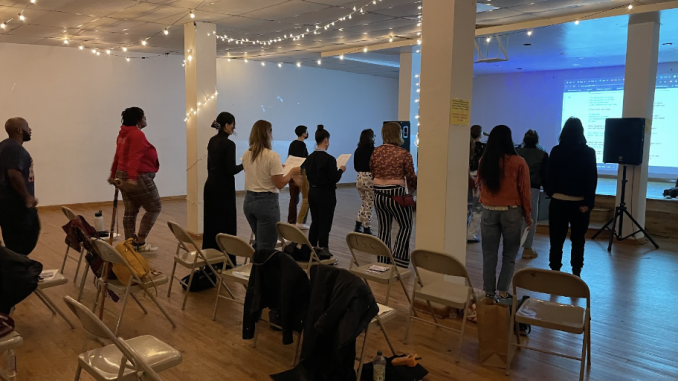
BY WILLIAM HERNANDEZ
On April 24, organizers of the “We Protect Us” movement gathered participants at the Mayday Center in Bushwick to prepare for an upcoming grassroots feminism event on May 4. Participants ranged from current CUNY members to public supporters.
The event on May 4, happening at the CUNY Graduate Center, is a rally meant to bring attention to sexual abuse and the victims of the past and present. The “We Protect Us” movement was created by CUNY members and alumni looking to stand against sexual harassment.
“Often, when a victim speaks out against abuse, they are ignored while their abuser is protected from allegations and discipline. We stand up for those that universities won’t, so ‘We Protect Us’ is our way of taking a stand for those who have been silenced,” said Kelsey Chatlosh, a CUNY professor and co-organizer of the event.
During the event on April 24, participants were taught a chant inspired by the Chilean feminism group, LASTESIS, called “A Rapist in Your Path.” The chant is meant to be a rallying cry that calls out the oppressive systems and patriarchy responsible for allowing sexual abuse against women, non-binary, and trans people.
“This chant was a pillar of the ‘Me Too’ movement from 2019, and it’s become a global feminism war cry, it’s a powerful chant that makes it so that everyone that hears it is forced to think about these heavy topics and the reality that there are institutions that hurt us,” said Aqua Ruis, DJ and co-organizer of the event.
According to RAINN, “most college-age victims do not report sexual violence on campus. This is especially the case for college-age women. Only about 20% of female college students report sexual assaults to authorities.”
This is the reality that many sexual assault victims face, even when they do report their abuse to authorities there are little to no repercussions for their abusers. In most cases, institutions such as colleges fail to report rape statistics.
According to RAINN, “By law, U.S. colleges and universities must file annual reports that include statistics for sexually based crimes — but not all do. The American Association of University Women’s (AAUW) 2016 analysis of the Clery Act found that 89% of 11,000 colleges failed to disclose rape statistics.”
Movements such as the “Me Too” movement and “We Protect Us” serve as efforts to make these attempts by institutions to cover up sexual assault cases, come to light.
“No one was doing anything to help these people get the justice that they deserve, so we decided to be the platform that could help them,” said Chatlosh.
CUNY members and alumni hope that these efforts are heard by those that have the power to make a change.
“I love what they [We Protect Us] stand for, it’s great to see a group that helps people like me and my CUNY community,” said Brianna Carrion, an alumna of John Jay College of Criminal Justice.
